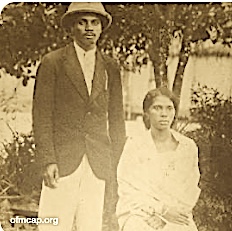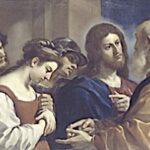After reciting the Regina Caeli on Sunday, April, 15 2018, Pope Francis beatified Lucien Botovasoa with the following words:
Dear brothers and sisters, today in Vohipeno, Madagascar, the martyr Lucien Botovasoa was declareded ‘Blessed’.
“He was the father of a family and a consistent witness to Christ until the heroic sacrifice of his life.
Arrested and executed for expressing his will to remain faithful to the Lord and to the Church, he represents for all of us an example of charity and of strength in the faith”.
The Life story of Lucien Botovasoa – from wikipedia
He was born sometime in 1908 in Madagascar (off the southeastern coast of Africa) as the first of nine brothers and sisters.
He first studied in a public school from 1918 before being baptized and receiving his First Communion in 1922.
He later completed his studies at the Jesuit College of Saint Joseph from 1922 until 1928 before becoming a teacher there with his new teaching diploma. He made it a practice of reading the lives of the saints after each lesson to those students who wanted to hear about them, often adding his own comments and words of encouragement to the students.
On October 10, 1930 he married Suzanna Soazana (born 1914) in his local parish and the couple had five children; his wife was pregnant with their last child at the time of Lucien’s murder. (His firstborn Vincent de Paul Hermann was born on 12 September 1931.
One nun once told Lucien that he would have made a fine priest and asked him if he had ever regretted getting marriage.
But Lucien answered without hesitation: “I have not the slightest regret” adding that it allowed him to serve God through this particular vocation.
Lucien was among the first to join the Crusaders of the Heart of Jesus when it settled in his hometown being received on 18 August 1935 before becoming its treasurer in 1936, a position he held until his death.
In addition to his native tongue he was fluent in Chinese, German and French.
He was an exceptional singer and musician and even served as the director of the parish choir.
He was also described as an athletic singer who smiled a lot!
But he wanted to become a religious although was well aware of the fact that he could not become a religious while still married.
He had no desire to leave his wife and children but wanted to become a secular religious.
He searched in books for saints who were married, but to no avail.
But providence led him in 1940 x to discover a manual on the Secular Franciscan Order, which immediately appealed to him.
But the Secular Franciscan Order did not exist in Madagascar, so he looked for people who would join him in founding a branch of the Order in the region. He gathered a local woman and other companions to establish such a branch. Lucien received the habit and the Order on December 18, 1944. His wife feared that he would leave her to become a religious, but instead he burst out laughing and assured her that this was the furthest thing from the truth. Lucien often fasted and dressed in plain beige pants and a khaki shirt because, he insisted, “that’s the color of the clothes that tertiaries wear.” His wife reproached him for not wearing black pants, as was traditional for teachers, though he kept telling her that this was insignificant in the light of his religious practices.
Into the new year in 1947 the general confidence of the population saw that a political organization wanted to present him as a candidate in its their elections but he refused, considering politics to be a strange and different realm for him, with which he did not want to associate himself. But soon there was great unrest in the region, with priests and nuns being rounded up before a full-scale uprising broke out.
He accepted his father’s invitation to return to his old hometown on March 30, 1947, but returned home on April 9, 1947, after hearing of massacres near his home, where he also learned of the rounding up of religious.[1] Lucien was well aware that he could be captured and killed because of his status as a religious educator, but he did not fear what would happen to him.
On 14 April 1947, he was at home having lunch with his wife and children when a pious woman came and told him of rumors that a teacher was to be summoned before the chief which prompted his wife to weep since she knew that it would be her husband.
Lucien remained unmoved by the news and after lunch spoke with his wife about what might happen to him and gave her final instructions for the care of their children and their unborn child.
At 9 p.m., four men knocked on his door and asked him to go with them to the chief who wanted to judge him.
He went with them and offered himself to them for death without complaint before being invited to sit and with the chief for half an hour before being led away. The chief pronounced the death sentence at 10:00 p.m. and Lucien was led away to be executed.[1]
Lucien was to be killed at the edge of the Matitanana River and was asked to stop and reflect on the way.
He knelt in deep contemplation for some time before continuing on his way.
When his captors arrived, they wanted to bind his hands together, although he offered to do it himself in the form of a cross.
He knelt at the edge of the water in contemplation and realized that the executioners were men he had once taught as students at the school.
The headsman decapitated Lucien with his sword, and the others took turns to strike a blow or dip the sword in his blood before throwing his remains into the water. He died wearing a beige khaki jacket and pants with a black cord for a belt.

